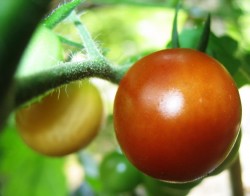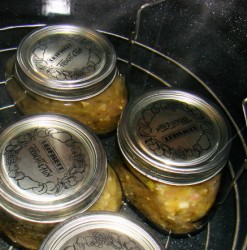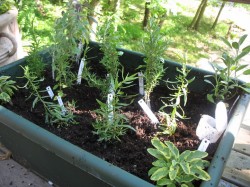Farming In The City
Farming in the city doesn’t sound as, well, sexy as “Sex In The City,” but it is still a catchy title.
As most of my longtime readers know, I grew up half in the city and half on a farm. On the weekdays, I lived in Charleston, West Virginia, where I attended the closest things to inner-city schools West Virginia has–Piedmont Elementary, Roosevelt Junior High School and Charleston High School. We had drug problems, violent altercations and even bomb scares now and again. Nothing like the school shootings one hears about now, but the schools were pretty rough, and the neighborhood where we lived wasn’t exactly suburban, if you know what I mean.
Then, on the weekends–nearly every weekend–and for weeks in the summer, I lived on my grandparents’ farm in rural Putnam County–only forty-five minutes from Charleston, but a place that was worlds away from city life. Time went slower on the farm, oddly slower, considering all of the activities we managed to cram into each day spent there. Planting corn, digging potatoes, putting up bean poles, mending fences, feeding cattle, hogs and chickens, picking strawberries, freezing peas, canning tomatoes, pulling turnips, making pickles, harvesting black walnuts, catching fish, butchering hogs, building cold frames, cutting and baling hay–the work on that farm was never-ending.
It was never ending, and it was wonderful. Living on that farm was like nothing else you can imagine–the dank, rich smell of the earth in the early spring during plowing, the sound of hens clucking and singing in the foggy still hours of dawn, the sight of maple trees gone to flame in the woods in October, and the sweet, fragrant burst of the first strawberry, warmed in the May sun and filled with juice.
I grew up learning all sorts of skills that were beyond the ken of my friends at school, skills that made it seem as if I lived part time in another century. When I described what I did on my weekends, or worse, during the summer, to the kids at Roosevelt or Charleston High, more than one of them laughed in disbelief and proclaimed that it sounded like I grew up in one of Laura Ingalls Wilder’s books. They would listen, goggle-eyed and scoffing when I would describe rapturously, how much fun it was to hang out with my family and crack black walnuts with hammers or spend back-breaking hours sweating in the potato field, digging tubers.
I could never convey that no matter how much work we did, and how hard it was, we still had time to play. It didn’t matter how much work we did in a day, we still had time for long walks in the woods where we saw squirrels chasing each other, wild turkeys foraging in the brush, and once, a rabbit plucked from the ground by a red-tailed hawk who dove like a flashing arrow from the sky, and just as fast, was gone again. We always had time for swimming or fishing in the pond, or catching tadpoles or toadlets. There was always a moment for a pick-up game of one-on-one basketball with an uncle, cousin or neighbor. There was time to ride the pony, time to run in circles and chase the farm dogs, time to climb trees and time to twirl in the tire swing that swayed beneath the huge black locust tree next to the barn.
And in the evenings, there was time for reading and gathering to watch a television program or two. And there was always time to lay under the night sky and stare up in awe at the stars–the stars that were unimaginably bright and seemed so close, far from the light pollution and smog of the city.
Nor could I make them understand that all of the food we produced tasted so much better. It was too much work, my friends said–why work so much when you can just go to the supermarket? Why grow lettuce from seeds when it was so cheap at the store? Why bother gathering eggs, why butcher cows, why harvest corn, gather walnuts? Why can tomatoes, why freeze beans, why make jelly or jam or pickles? They all are at the store….
I could never convince them that corn tasted unimaginably sweet and sunny when you picked it one minute, husked it the next and dropped it for only a minute in boiling water just seconds later. Or how good eggs gathered from the warmth of a hen’s nest one minute, then fried the next. I could never explain the richness of the yolk–the brilliant orange color that came from hens who gathered bugs and grass and snippets of weeds from the garden. Or how sweet and clean-tasting a catfish you caught yourself tasted. Or how the meat of a steer who was raised on grass and hay and corn we grew ourselves and who was never mistreated, but petted and loved every day of his life was so much better. Or how blackberry jelly made from berries gathered along the edge of the woods tasted exactly like the long days of summer!
They never understood, and I always felt that maybe they were right–I had grown up straddling two realities, two times, two lifestyles and I never felt quite at home in either. (The rural kids I played with all summer long liked me, but thought I was quite strange, very bookish and unable to speak their language without sounding awkward. I never could call a dragonfly a “snakedoctor,” or say “crick” or “yonder” without making a fool of myself.)
But it seems that some of those kids, and their peers around the country, and some from the generations after us, now that they have grown up, have finally learned what I tried to teach some of them years ago. The old ways that Laura Ingalls Wilder wrote about, of preserving food for the winter, of self-reliance and of being intimately involved in the production of your own food are coming back into vogue, and not just by the “back-to-the-landers” who left the rat race years ago and moved to rural communities and started farms of their own. The folks who have started valuing self reliance and food production, who have started raising chickens, growing vegetables and fruits in their yards and canning their produce are city dwellers.
Kitchen gardening is on the rise; folks are digging up their yards and planting on terraces even more than before, and community gardens are filling up and expanding. In municipalities which allow it, backyard farmers are adding a few chickens for their eggs and their bug-hunting capabilities. (Not to mention their entertainment value–chickens really are fun to watch.) And for those who grow their own food or those who buy too much lovely produce at farm stands or pick-your-own farms or farmer’s markets, it is only natural to learn how to preserve these foods by canning, pickling, making fruit preserves or freezing.
The recession, a growing local food movement, and mistrust in our food supply arising from various incidents of contamination in the food chain, have propelled this burgeoning interest, but the truth is–I don’t really care why all of this is happening.
I only care that it is happening.
Because the truth is–we humans -need- to be connected to our food supply. Having responsibility for some of our food connects us to the cycles of life, the seasons, and the natural world in a way that I believe is as healthy for our minds and spirits as it is for our bodies. I think it is good for our souls to be involved in the growing and preservation of some of our food–it gets outside, in the sun (which helps our bodies make the all-important vitamin D!) and in the air. It connects us with the world in a visceral way, in a way that feeds us, body and soul.
Remember, I believe that food is not just physical fuel for our bodies–it feeds our spirits and minds as well. When we learn new skills, we keep our minds supple and alert–our intellects grow stronger with each skill we study and learn. Our bodies grow fit with work to do, real work, and our spirits, when connected with the world, grow and develop peacefully.
I have read comments from cynics who decry people who grow their own vegetables in their yards or keep chickens or can tomatoes from the farmer’s market as “foolish” at best or “idiots” at worst. I don’t care what people like that say–attacking those who live life differently than you do is not a good endorsement for your point of view. If one doesn’t want to grow food–don’t.
I won’t look down on them for it.
But, the truth is, I will feel sorry for them.
Because I cannot make them understand; my words are inadequate to describe the richness of experience that comes from such a life.
8 Comments
RSS feed for comments on this post.
Sorry, the comment form is closed at this time.
Powered by WordPress. Graphics by Zak Kramer.
Design update by Daniel Trout.
Entries and comments feeds.






Well said Barbara. I am waiting for the day i own my on house to start planting . It wont stop me now that i go to my family’s garden to plant a few vege’s , fruits and herbs
Comment by sam — May 27, 2009 #
From your pen to my heart, you eloquently expressed what I feel. I keep talking, this can be a way of life! My husband and I live in a very urban – inner city condo in the heart of the dessert that is phoenix, in the little foot of dirt that edges our patio I grow tomatoes, herbs, vegetables. Getting up early on Saturday to buy produce for a family that grew it is not a burden, but a privileged.
Comment by KCatGU — May 27, 2009 #
Beautiful post! The tasteless produce in a store is no comparison to fresh picked.
We’re excited to (finally) be living in a temperate climate (after twenty years in the frozen tundra called Michigan) and we recently planted our first winter garden (oh, should explain, we’re in Argentina where seasons are opposite). Already our peas are about 3-4″ tall and everything is up except the green onions. We’re pretty excited to “see our garden grow” 🙂 The municipality offered a free talk on winter gardening and we attended, and then they gave us the seeds free. How cool is that?!
Next week the hubby’s going to the nearby big city of Cordoba for a talk on growing and caring for fruit trees. We have a peach tree in our yard here and planted a bunch of citrus at the family house out in the country (someone gave us a dozen trees for free!).
I’m hoping to find canning jars between now and the next time our peach tree produces bushels and bushels of luscious fruit. We froze what we could this January but only have a tiny freezer in our fridge at this point. We are looking to buy a stand-alone freezer too.
Unfortunately canning is not a common thing here and I’ve thus far been unsuccessful. Could absolutely kick myself for giving away the 6 dozen jars I had in the U.S. But was afraid they wouldn’t make the trip well (we had a container shipped over) and thought I could just buy more here. Live and learn.
Comment by Kim — May 28, 2009 #
You may have to mail order canning jars, Kim. If I wasn’t worried about my ability to pack jars to get to you, I’d send you some of my extras—they were my Grandma’s–if you paid shipping, but I would be afraid my packing ability would not let the jars survive the trip from Ohio to Argentina!
As I understand, Argentina is a beautiful place–I hope you enjoy your new home!
Comment by Barbara — May 28, 2009 #
Exactly how I feel!
Comment by Zoe Dawn — May 28, 2009 #
Great post! I’d love to live on a farm.
Comment by Memphis Aggie — May 29, 2009 #
This was so beautiful! I also grew up an urban (or suburban) life with vacations at my grandparents farm. My parents both grew up on farms and have it in their blood and I guess I do too. Wish we could preserve the family farm and save it from encroaching agribusiness . . . like we happen to be writing about on lipstickdaily!
Comment by Elaine at Lipstickdaily — May 31, 2009 #
Next month I’m moving to a house where I’ll finally get to have a backyard garden again! We’re renting it, but the landlord doesn’t seem to care what we do with the yard. I’m already planning on about 1/3 of it, at least, being a veggie garden. The rest I’m going to plant in native wildflowers and prairie grasses.
No Bermuda or St. Augustine for me!
My mom let me take over our family veggie garden when I was 12, and I kept going until I moved out for college and living in apartments. Ever since I’ve been relying on CSA’s or farmers markets, but it’s just not the same as growing it myself. It makes me feel so much more connected to Nature and the seasons when I do.
Comment by Neohippie — May 31, 2009 #